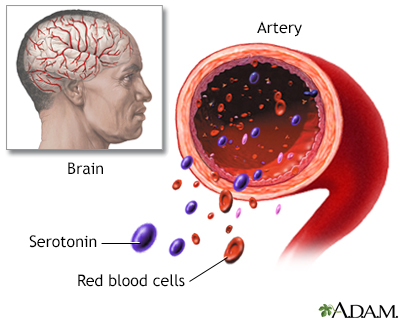Carcinoid syndrome
Flush syndrome; Functioning argentaffinoma syndrome
Carcinoid syndrome is a group of symptoms associated with carcinoid tumors. These are tumors most often of the small intestine, colon, appendix, pancreas, or bronchial tubes in the lungs.
Images

Causes
Carcinoid syndrome is the pattern of symptoms sometimes seen in people with carcinoid tumors. These tumors are rare, and often slow growing. Most carcinoid tumors are found in the gastrointestinal tract and lungs.
Carcinoid syndrome occurs in very few people with carcinoid tumors, typically after the tumor has spread to the liver or lung.
These tumors release too much of the hormone serotonin, as well as several other chemicals. These hormones cause the blood vessels to open (dilate). This causes carcinoid syndrome.
Symptoms
The carcinoid syndrome is made up of four main symptoms including:
- Flushing (face, neck, or upper chest), or widened blood vessels seen on the skin (telangiectasias)
- Difficulty breathing, such as wheezing
- Diarrhea
- Heart problems, such as leaking heart valves, blood pressure changes, and heart palpitations
Symptoms are sometimes brought on by physical exertion, or eating or drinking things such as blue cheese, chocolate, or red wine.
Exams and Tests
Often these tumors are found due to symptoms such as weight loss, abdominal pain, and diarrhea. Sometimes they may be discovered during tests or procedures for other conditions.
If a physical exam is done, your health care provider may find signs of:
Tests that may be done include:
- 5-HIAA levels in urine
- Blood tests (including serotonin and chromogranin A blood tests)
- CT and MRI scan of the chest or abdomen
- Echocardiogram
- A special PET scan called a gallium
Treatment
Surgery to remove the tumor is usually the first treatment. It can permanently cure the condition if the tumor is completely removed.
If the tumor has spread to the liver, treatment involves either of the following:
- Removing areas of the liver that have tumor cells
- Sending (infusing) medicine directly into the liver to destroy the tumors
When the entire tumor can't be removed, removing large portions of the tumor ("debulking") can help relieve the symptoms.
Octreotide (Sandostatin) or lanreotide (Somatuline) injections are given to people with advanced carcinoid tumors that can't be removed with surgery.
For people with advanced carcinoid tumors that can't be removed with surgery, octreotide (Sandostatin) or lanreotide (Somatuline) injections are given to shrink or slow the growth of the tumor.
Some common medicines, like selective serotonin reuptake inhibitors (SSRIs), such as paroxetine (Paxil) and fluoxetine (Prozac), may make symptoms worse by increasing levels of serotonin. However, do not stop taking these medicines unless your provider tells you to do so.
Support Groups
Learn more about carcinoid syndrome and get support from:
- The Carcinoid Cancer Foundation -- www.carcinoid.org/resources/support-groups/directory/
- Neuroendocrine Tumor Research Foundation -- netrf.org/for-patients/
Outlook (Prognosis)
The outlook in people with carcinoid syndrome is different from the outlook in people who have carcinoid tumors without the syndrome. Most people with carcinoid tumors will not develop carcinoid syndrome.
In people with carcinoid syndrome, the tumor has usually spread to the liver. This lowers the survival rate. Overall, the prognosis is usually poor.
Possible Complications
Complications of carcinoid tumors may include:
- Increased risk of falls and injury (from low blood pressure)
- Bowel obstruction (from tumor)
- Gastrointestinal bleeding
- Heart valve failure
A fatal form of carcinoid syndrome, carcinoid crisis, may occur as a side effect of surgery, anesthesia or chemotherapy.
When to Contact a Medical Professional
Contact your provider for an appointment if you have symptoms of carcinoid syndrome.
Prevention
Treating the tumor reduces the risk of carcinoid syndrome.
Related Information
Serotonin blood testNiacin
Protein in diet
5-HIAA urine test
Wheezing
Gastrointestinal bleeding
Intestinal obstruction and Ileus
Endoscopic thoracic sympathectomy
Iontophoresis
References
De Herder WW, Feelders RA, Hofland J. Neuroendocrine tumors and disorders. In: Melmed S, Auchus RJ, Goldfine AB, Rosen CJ, Kopp PA, eds. Williams Textbook of Endocrinology. 15th ed. Philadelphia, PA: Elsevier; 2025:chap 43.
Gan T, Evers BM. Small intestine. In: Townsend Jr CM, Beauchamp RD, Evers BM, Mattox KL, eds. Sabiston Textbook of Surgery. 21st ed. St. Louis, MO: Elsevier; 2022:chap 50.
National Cancer Institute website. Gastrointestinal neuroendocrine tumors treatment (PDQ) - health professional version. www.cancer.gov/types/gi-neuroendocrine-tumors/hp/gi-neuroendocrine-treatment-pdq. Updated September 19, 2024. Accessed February 24, 2025.
Wolin EM, Jensen RT. Neuroendocrine neoplasms. In: Goldman L, Cooney KA, eds. Goldman-Cecil Medicine. 27th ed. Philadelphia, PA: Elsevier; 2024:chap 213.
BACK TO TOPReview Date: 7/29/2024
Reviewed By: Warren Brenner, MD, Oncologist, Lynn Cancer Institute, Boca Raton, FL. Review provided by VeriMed Healthcare Network. Also reviewed by David C. Dugdale, MD, Medical Director, Brenda Conaway, Editorial Director, and the A.D.A.M. Editorial team. Editorial update 02/24/2025.

Health Content Provider
06/01/2025
|
A.D.A.M., Inc. is accredited by URAC, for Health Content Provider (www.urac.org). URAC's accreditation program is an independent audit to verify that A.D.A.M. follows rigorous standards of quality and accountability. A.D.A.M. is among the first to achieve this important distinction for online health information and services. Learn more about A.D.A.M.'s editorial policy, editorial process and privacy policy. A.D.A.M. is also a founding member of Hi-Ethics. This site complied with the HONcode standard for trustworthy health information from 1995 to 2022, after which HON (Health On the Net, a not-for-profit organization that promoted transparent and reliable health information online) was discontinued. |
The information provided herein should not be used during any medical emergency or for the diagnosis or treatment of any medical condition. A licensed medical professional should be consulted for diagnosis and treatment of any and all medical conditions. Links to other sites are provided for information only -- they do not constitute endorsements of those other sites. © 1997- 2025 A.D.A.M., a business unit of Ebix, Inc. Any duplication or distribution of the information contained herein is strictly prohibited.
